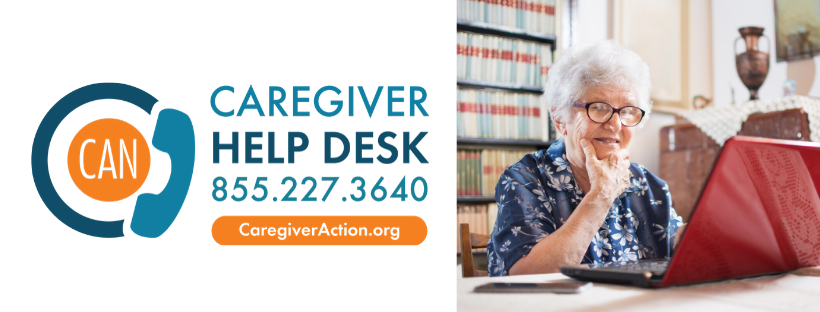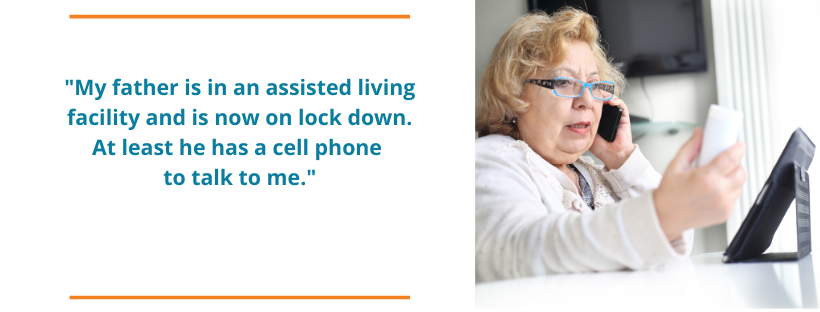Tips for Family Caregivers During the COVID-19 Pandemic
At Caregiver Action Network, we are family caregivers too, so we get it. Caregivers are great at planning ahead and managing unexpected health crises, but with COVID-19 there wasn’t time to plan and it’s hard to keep track of the rapidly changing, and sometimes conflicting, information available. We have been dealing with this pandemic for more than a year now, and it is exhausting. At times it might seem like there is no end in sight but hang in there. We are going to get through this together. Here are some tips that can help keep you and your loved ones as safe as possible until this is over.
Follow the guidance of the CDC.
The CDC has put together a number of resources to answer specific questions and address concerns you may have. They have also formulated this guidance for caring for someone sick at home. CDC guidance changes frequently as we learn more about the virus, vaccination rates increase, and the situation changes, so be sure to check back for updated information. The CDC's current recommendations to help ensure everyone’s health and safety, include:
- Avoid large crowds. Currently, the CDC is recommending no public gatherings exceeding 10 participants.
- Avoid non-essential travel.
Vaccinations
Based on what we know about COVID-19 vaccines, CDC guidance says that people who have been fully vaccinated can start to do some things that they had stopped doing because of the pandemic.
We’re still learning how vaccines will affect the spread of COVID-19. After you’ve been fully vaccinated against COVID-19, you should keep taking precautions—like wearing a mask, staying 6 feet apart from others, and avoiding crowds and poorly ventilated spaces—in public places until we know more.
These recommendations can help you make decisions about daily activities after you are fully vaccinated. These recommendations are not intended for healthcare settings.
Have You Been Fully Vaccinated? People are considered fully vaccinated:
- 2 weeks after their second dose in a 2-dose series, such as the Pfizer or Moderna vaccines, or
- 2 weeks after a single-dose vaccine, such as Johnson & Johnson’s Janssen vaccine
If you don’t meet either of these benchmarks, you are NOT fully vaccinated. Keep taking all precautions until you are fully vaccinated.
What You Should Keep Doing, Even If You've Been Fully Vaccinated:
- You should still take steps to protect yourself and others in many situations, like wearing a mask, staying at least 6 feet apart from others, and avoiding crowds and poorly ventilated spaces. Take these precautions whenever you are:
- In public
- Gathering with unvaccinated people from more than one other household
- Visiting with an unvaccinated person who is at increased risk of severe illness or death from COVID-19 or who lives with a person at increased risk
- You should continue to avoid medium- or large-sized gatherings.
- You should still watch out for symptoms of COVID-19, especially if you’ve been around someone who is sick. If you have symptoms of COVID-19, you should get tested and stay home and away from others.
If You’ve Been Fully Vaccinated, What You Can Start to Do:
- You can gather indoors with fully vaccinated people without wearing a mask or staying 6 feet apart.
- You can visit your father who is in a nursing home or assisted living setting.
- You can gather indoors with unvaccinated people of any age from one other household (for example, visiting with relatives who all live together) without masks or staying 6 feet apart, unless any of those people or anyone they live with has an increased risk for severe illness from COVID-19.
- You can ask your brother living in another state to come and help you care for your dad with ailing health.
- If you’ve been around someone who has COVID-19, you do not need to stay away from others or get tested unless you have symptoms.
Check to see if your loved one's medications are part of a patient assistance program
During this time, many pharmaceutical companies are expanding their patient support programs to help eligible unemployed patients in the U.S. who have lost their health insurance due to the COVID-19 pandemic. These expanded programs offer access to many prescription medications for free.
Monitor the health of your loved one and keep in touch with their medical team
Many health care plans and practices have their own guidelines for how and when they should be contacted about possible COVID-19 exposure or symptoms. Call your loved one’s primary care doctor and ask how they want you to proceed.
Only go to the Emergency Room for emergencies
If you suspect that you or your loved one are experiencing COVID-19 symptoms, call your doctor.
Know your own risk factors
Do you have a chronic condition? Are you immunosuppressed? Many caregivers themselves have health issues, so don’t put yourself in unnecessary danger.
Be aware of any changes to visitation policies
Many hospitals and emergency rooms limit the number of visitors a patient can have. In a situation where you are not allowed to be with your loved one in the hospital or emergency room, discuss a strategy with staff that will allow you to get updates on your loved one. Many nursing homes and assisted living facilities have also made changes to their visitation policies. New CDC guidance recommends that unvaccinated visitors and nursing home residents be allowed to meet in person except for a few circumstances where there is high risk of COVID-19 transmission—and compassionate care visits should be allowed at all times. While indoor visits are allowed, outdoor visits pose less risk and are preferred.
Ask about changes to medical appointments
To minimize the risk of exposure during the pandemic and stay engaged with their patients, many healthcare providers have switched to telehealth or video appointments. While this makes medical visits safer, it brings added problems for family caregivers. Family caregivers need to be able to engage in a virtual visit the same way they would if they were in an exam room with their loved one. That requires caregivers to ensure that they are properly set up with technology and are comfortable with the system that the doctor will use. Healthcare providers need to make sure that they use video conferencing platforms and have policies that allow a caregiver to join a visit from a third location.
Self-care is Important
Being a family caregiver is stressful under usual circumstances. The COVID-19 pandemic brings even more stress and anxiety. Caregivers now need to ensure that they’re following COVID-19 safety precautions on top of all their other caregiving tasks. Many of the services that you used pre-pandemic are no longer an option—so you need to do more yourself. With these added sources of stress, it’s even more important now that you’re taking care of yourself. Check out our 10 Tips for Family Caregivers as well as the screener to help you identify and address emerging mental health issues.
CAN Resources
Crisis Symptom Reporting Guide
Use this guide to prepare for a call with emergency medical services, a doctor or other medical professional.
Medication Checklist
Make sure you have an accurate, up-to-date list of your loved one’s medications handy, both prescription and over-the-counter.
These guides will help you be clear and concise when talking with your loved one’s medical team – and hopefully will help them to really hear what you are saying.
Patient File Checklist
One important thing you can do is maintain an updated and comprehensive file of information about your loved one’s health. This can be done in a variety of ways including, paper and electronic solutions or some combination of both. Mobile health apps also help to keep you and your loved one’s patient file in the palm of your hand.
Mental Health And COVID-19 – Information And Resources



